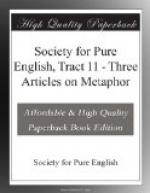IRRELEVANT ALLUSION
We all know the people—for they are the majority, and probably include our particular selves—who cannot carry on the ordinary business of everyday talk without the use of phrases containing a part that is appropriate, and another that is pointless or worse; the two parts have associated themselves together in their minds as making up what somebody has said, and what others as well as they will find familiar, and they have the sort of pleasure in producing the combination that a child has in airing a newly acquired word. There is, indeed, a certain charm in the grown man’s boyish ebullience, not to be restrained by thoughts of relevance from letting the exuberant phrase jet forth. And for that charm we put up with it when a speaker draws our attention to the methodical by telling us there is a method in the madness, though method and not madness is all there is to see, when another’s every winter is the winter of his discontent, when a third cannot complain of the light without calling it religious as well as dim, when for a fourth nothing can be rotten outside the State of Denmark, or when a fifth, asked whether he does not owe you 1s. 6d. for that cab fare, owns the soft impeachment.
A slightly fuller examination of a single example may be useful. The phrase to leave severely alone has two reasonable uses—one in the original sense of to leave alone as a method of severe treatment, i.e. to send to Coventry or show contempt for, and the other in contexts where severely is to be interpreted by contraries—to leave alone by way not of punishing the object, but of avoiding consequences for the subject. The straightforward meaning, and the ironical, are both good; anything between them, in which the real meaning is merely to leave alone, and severely is no more than an echo, is pointless and vapid and in print intolerable. Examples follow: (1, straightforward) You must show him, by leaving him severely alone, by putting him into a moral Coventry, your detestation of the crime; (2, ironical) Fish of prey do not appear to relish the sharp spines of the stickleback, and usually seem to leave them severely alone; (3, pointless) Austria forbids children to smoke in public places; and in German schools and military colleges there are laws upon the subject; France, Spain, Greece, and Portugal leave the matter severely alone. It is obvious at once how horrible the faded jocularity of No. 3 is in print; and, though things like it come crowding upon one another in most conversation, they are not very easy to find in newspapers and books of any merit; a small gleaning of them follows:
The moral, as Alice would say, appeared to be that, despite its difference in degree, an obvious essential in the right kind of education had been equally lacking to both these girls (as Alice, or indeed as you or I, might say).




